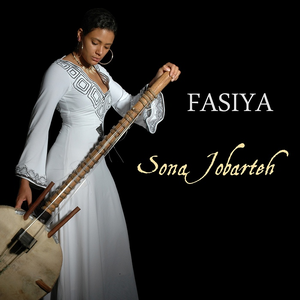Musow
Sona Jobarteh Lyrics
Jump to: Overall Meaning ↴ Line by Line Meaning ↴
Sadiô go musow nhaminaaa
Umanô, Umanô, dê diuniaaa
Umanô clo mussoniádiê camissaiaiê
Imaiê, fura musodiu unssaratiê
Canaguiê urodianiê ê musow quê dioniê
Atiguinê camussorandú quiensá, musow, musow musow
Thifarinun diubêborandú nançá, musow, musow, musow
Atinigui camussorandú diensá, musow, musow musow
Canatigui diuvebôrandú nançá, musow, musow, musow
Mussoiêmunimuguessá raladêia flomá
Cadiurô quimunhociá, raaa ualassá beumbé baricá
Rumanhadidiê,quinhadidiê, rumassecassilá
Ualaedioôn cadianca sembalidê
Rumanhadidiê,quinhadidiê, rumassecassilá
Remaima cussanca simbani gundiê
Atiguinê camussorandú quiensá, musow, musow musow
Thifarinun diubêborandú nançá, musow, musow, musow
Atinigui camussorandú quiensá, musow, musow musow
Canatigui diuvebôrandú nançá, musow, musow, musow
Raiaiê, diuniasambábu
Diunia iasambabúiê
Sona Jobarteh's song "Musow" is a tribute to the resilience of the Manding people of West Africa. The song opens with the repeated phrase "Ô, ô musow tiurulaaa," which refers to the traditional role of the jeli or griot in Manding society. Jelis are oral historians and storytellers who preserve the traditions and history of their people through music, poetry, and song. The next line, "Sadiô go musow nhaminaaa," means "In this world, only the musow are respected." Musow is a term that refers to the Manding people and their culture.
The chorus of the song highlights the importance of the musow and their connection to their ancestors and the land. The lines "Umanô, Umanô, dê diuniaaa / Umanô clo mussoniádiê camissaiaiê" mean "The people, the people, are of the world / The people and the land are one and the same." This connection to the land and their ancestors is what gives the musow strength and resilience.
The verses of the song describe the struggles that the musow have faced and continue to face, from the slave trade to the exploitation of their natural resources. The lines "Imaiê, fura musodiu unssaratiê / Canaguiê urodianiê ê musow quê dioniê" mean "The foreigners came and took our land / They exploited the musow and left them helpless." Despite these challenges, the musow remain strong and proud of their traditions and history.
Overall, "Musow" is a powerful tribute to the strength and resilience of the Manding people and their culture.
Line by Line Meaning
Ô, ô musow tiurulaaa
Oh, sacred music sings out loud
Sadiô go musow nhaminaaa
Sadiô, here's the sound of the music
Umanô, Umanô, dê diuniaaa
Humanity, humanity, from the world
Umanô clo mussoniádiê camissaiaiê
From humanity, the music rises up
Imaiê, fura musodiu unssaratiê
Come, take this music and free yourself
Canaguiê urodianiê ê musow quê dioniê
Let the music guide your soul
Atiguinê camussorandú quiensá, musow, musow musow
Let's dance and let the music take us
Thifarinun diubêborandú nançá, musow, musow, musow
Let's move our bodies to the music
Atinigui camussorandú diensá, musow, musow musow
Let's follow the rhythm and dance
Canatigui diuvebôrandú nançá, musow, musow, musow
Let's unite with the music and move
Mussoiêmunimuguessá raladêia flomá
The music has the power to connect us
Cadiurô quimunhociá, raaa ualassá beumbé baricá
The beats of the music make us feel alive
Rumanhadidiê,quinhadidiê, rumassecassilá
The music flows and takes us away
Ualaedioôn cadianca sembalidê
From the melody, a new one arises
Remaima cussanca simbani gundiê
The music echoes and takes us higher
Raiaiê, diuniasambábu
Let's celebrate the world with music
Diunia iasambabúiê
The world sings and dances
Contributed by Scarlett F. Suggest a correction in the comments below.

@kvrijt
You might well know a straight descendant of the instrument.
The Griots also had simpler 'traveling' versions of the instrument like the 'Akonting" for example.
These found their way to the Americas in the dark days of slavery and eventually evolved into the 5-string banjo.
I happen to play traditional claw hammer style banjo which I learned through listening to old recordings and such.
Once I had the privilege of playing with an African Griot at a due in Belgium.
We could not speak with each other because we didn't speak each other's language but we found out we had scores of tunes in common.
One of the highlights in my life. So much fun!
BLACK MUSIC MATTERS :-)
Love to all from the Netherlands
@malingasarmandocumbane2300
The duty of watching that song still alive. Who's at 2021 with me?
@edytaedyta5076
😀
@granny398
Here
@cynthiahoag3544
yah - here in US.... she is amazing - such pure positive energy.
@morraanarchist4389
22
@malingasarmandocumbane2300
@@morraanarchist4389 Nice!
@pankan01
Greetings from Poland and a lot of love for the African Nations ♥️
@lawanmusa5127
THAT'S GOOD
@rohaxfx001
I'm a 35 year old half Indian guy from Australia, I've always loved African music, back in the 90's my dad had some old encarta program on the computer that had excerpts of African music - and I couldn't get enough of it. Looking at this awesome musician, and the crowd, which is a lot of grey hair, old hippies? Doesn't matter, I just know these are my people. A big mixture of everything and everyone coming together. I love it. Great song.
@laminjarju2872
Gambians are proud of u sona 🇬🇲🇬🇲🇬🇲🇬🇲🇬🇲